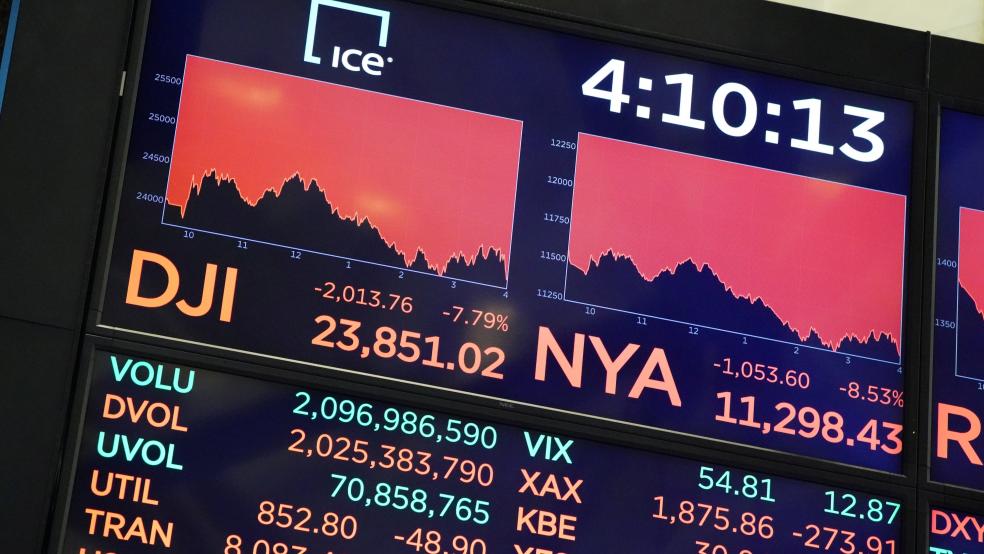Stocks cratered on Monday, suffering their worst daily drop in more than nine years, as the spread of the coronavirus and a clash between Saudi Arabia and Russia over oil prices left investors again looking for safety. The S&P 500 fell 7.6%, its worst daily decline since 2008.
The market plunge triggered an automatic 15-minute halt to trading shortly after the opening bell, reportedly the first such pause in 23 years.
As investors fled to safe havens, the yields on Treasury securities continued their recent slide, with rates on 10-year Treasury notes dropping 0.4% and briefly touching a stunning all-time low of 0.318%. (“This is the market's way of begging Treasury secretary Steven Mnuchin to invest in projects that will improve America's economic health over the long term,” Axios’s Felix Salmon wrote.) The 30-year rate fell below 1%.
“The world economy essentially just got a one-two punch to the face,” The Washington Post’s Heather Long wrote.
Rising recession risk: The fear is that those dual blows could tip the economy into a recession as the virus disrupts business and forces people to hunker down at home and an oil price war threatens energy companies in the United States and elsewhere. The action in stock, bond and energy markets all signal that investors believe the recession risk is very real.
“We are going to take a hit. It might not be a full out recession, but we’re moving closer to that,” economist Claudia Sahm, an expert on recessions, told the Post. Bloomberg’s Businessweek’s Peter Coy was even more pessimistic: “Let’s just say it: The longest economic expansion in U.S. history may already be over, killed by Covid-19.”
What the Trump administration might do: President Trump last week signed an $8.3 billion bill to fund the public health response to the virus, but the White House is under intense pressure to deliver a broader plan addressing both the health and economic concerns stemming from the outbreak.
Trump and his top economic adviser, Larry Kudlow, have both downplayed the threat from the virus, and the White House still does not have an economic response plan. But The Washington Post reports that the White House National Economic Council and Treasury Department have been discussing potential actions to help limit the economic damage for 10 days. White House advisers were reportedly set to present the president with a list of policy options on Monday afternoon.
Those options reportedly include paid sick leave, deferred taxes on hard-hit industries and emergency cash assistance for small businesses. Trump has also discussed the possibility of a payroll tax cut, but top administration officials have given attention to a short-term expansion of paid sick leave “because it would cost less,” Bloomberg News reports. White House officials reportedly have also considered providing money to geographic regions of the country hurt most by the virus. (Update: At a Monday evening press conference, Trump said he would discuss a payroll tax cut with congressional Republicans on Tuesday.)
“The timing of any of the economic measures is unclear, but they would likely be rolled out on a step-by-step basis, beginning with aid to individual Americans who are infected, then expanding to companies and workers affected by lost business,” according to Bloomberg News.
Congress lays out its priorities: House Speaker Nancy Pelosi and Senate Democratic Leader Chuck Schumer on Sunday issued their own list of priorities for a coronavirus response and called for the administration to do more, with a focus on worker-friendly policies. “In light of reports that the Trump administration is considering new tax cuts for major corporations impacted by the coronavirus, we are demanding that the administration prioritize the health and safety of American workers and their families over corporate interests,” they said in a statement.
Pelosi and Schumer called for paid sick leave, enhanced unemployment insurance, expanded food assistance programs, free coronavirus testing and reimbursement for uncovered costs of treatment. House Democratic leaders reportedly plan to meet Monday evening to plan their own legislative proposals.
Rep. Rosa DeLauro (D-CT), a member of the House Appropriations Committee, “has introduced legislation mandating 14 days of paid sick leave in the case of an emergency health crisis such as coronavirus, noting that most workers -- especially low-wage workers -- have no paid sick leave and thus would face difficulty complying with medical quarantine advice,” the Post reports.
Senate Finance Committee Chairman Chuck Grassley (R-IA), meanwhile, “is exploring the possibility of targeted tax relief measures that could provide a timely and effective response to the coronavirus,” a spokesman said Monday.
This article was updated at 6:38 p.m. on Monday, March 9.





